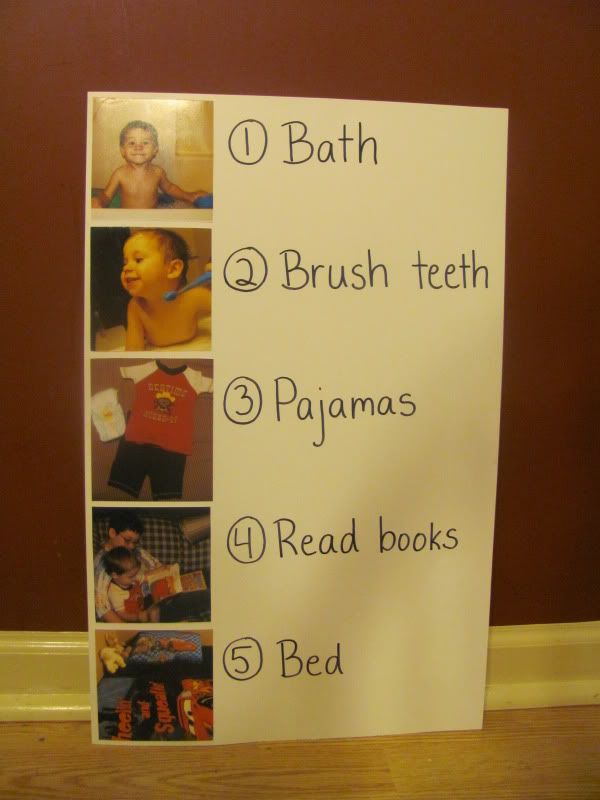It’s a long story, I know– but it was a long labor!
I began having contractions that were timeable and real (not random Braxton Hicks) on Friday, December 2. By Friday evening, they were averaging 4-5 minutes apart and 45-60 seconds long. And then… they pretty much stopped. I had a few here and there during the night and the next morning, and by Saturday afternoon they were becoming more frequent again. But again, they faded by the evening. Saturday night I slept soundly, and if I had any contractions through most of the night, I didn’t notice them.
On Sunday morning, I woke with contractions. “Here we go again,” I thought, wondering just how many days of prelabor I’d end up having. But a trip to the bathroom led me to believe that I might be losing my mucous plug– only it was greenish in color. This was something I hadn’t seen before. Contractions continued, and they were getting slightly stronger, but they were probably 10-15 minutes apart. Still, the color of the mucous plug concerned me a bit, so I went ahead and called Debi, my midwife. She reassured me that it was within the realm of normal, and she offered to come out to my house. I thought that sounded like a good idea. I also called my mom. I didn’t know if it was the real thing or not, but I knew I wanted her with me. Within an hour, she and my dad arrived; his job was to entertain Elijah and Isaac.
Debi arrived and checked me around 9:30. I was 4-5 centimeters dilated and nearly 100% effaced. She began unloading her supplies and equipment from her car, and it hit me that this really was happening. I was actually in labor. It was December 4, the due date. As my best friend said, that’s a little conventional for me.
Things continued moving along very slowly. Contractions remained at least 15 minutes apart, and sometimes they came even less frequently than that. Throughout the morning and afternoon, I took a couple naps, walked around the neighborhood twice, sat and talked with everyone for a while, did hip circles on the yoga ball… and waited. My dad took the boys out to lunch and I hoped things would pick up while they were gone, but no such luck.
We made arrangements for the boys to spend the night with Clark’s dad and stepmom. After they left, probably around 6:00 or so, I began to sense a shift in my mood. I didn’t feel very talkative anymore, didn’t want many people around, and I felt the need to retreat within myself through contractions– which were becoming noticeably stronger and slightly closer together.
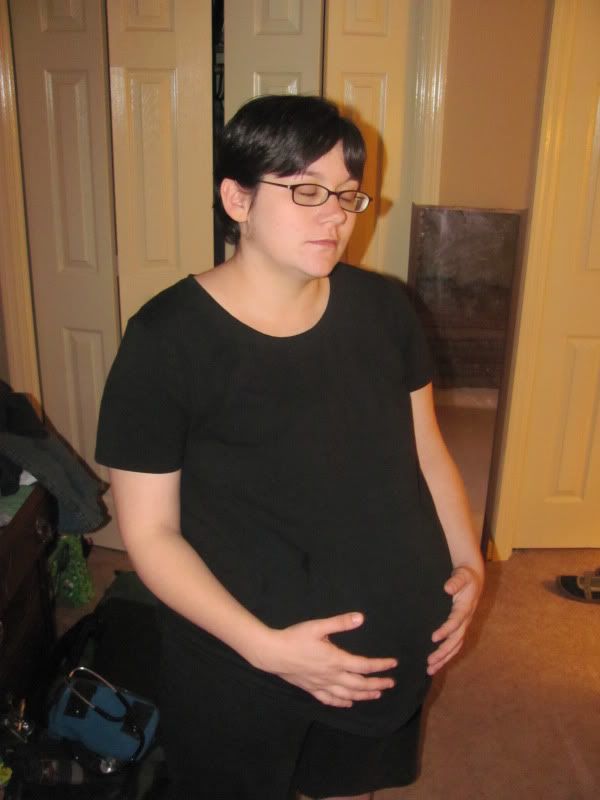
By this time I was feeling awfully discouraged. I’d had a long, slow labor with Isaac, and I had really hoped this one would go quickly. I began thinking that maybe contractions would stop yet again, just as they had on Friday and Saturday. Perhaps I wouldn’t have a due date baby after all.
Debi checked me again around 8:30 and I was at 6 centimeters. I felt so discouraged. All those hours and I’d only progressed 1-2 centimeters? She encouraged me to shower, to relax, and maybe get some rest.
I went to the bathroom to shower. Looking back, I think I was rapidly hurtling into transition, but at the time I just felt miserable. I cried in the shower and silently wished for pitocin to speed things up and an epidural so I wouldn’t have to deal with feeling any more contractions. They were coming harder and faster; I had four of them during the time I was in the shower.
After the shower, I tried to rest, but a contraction soon brought me right back out of the bed. I couldn’t sit or lie down; I had to be on my feet to get through them. At this point, contractions became much more frequent and much, much stronger. I leaned against Clark, swaying from side to side, breathing and groaning my way through each one. Debi filled the birth pool, and I got in the water around 10:30.
At first it felt amazing. The constant ache in my lower back was immediately relieved. But then another contraction hit and I found myself scrambling to find a comfortable position. Between contractions, I was fine with leaning back against the side of the pool, but once a contraction began, I couldn’t stand to stay there. I sat up straighter, supporting my weight with my arms, and swayed back and forth. Keeping my hips moving brought some relief from the stronger and stronger contractions.
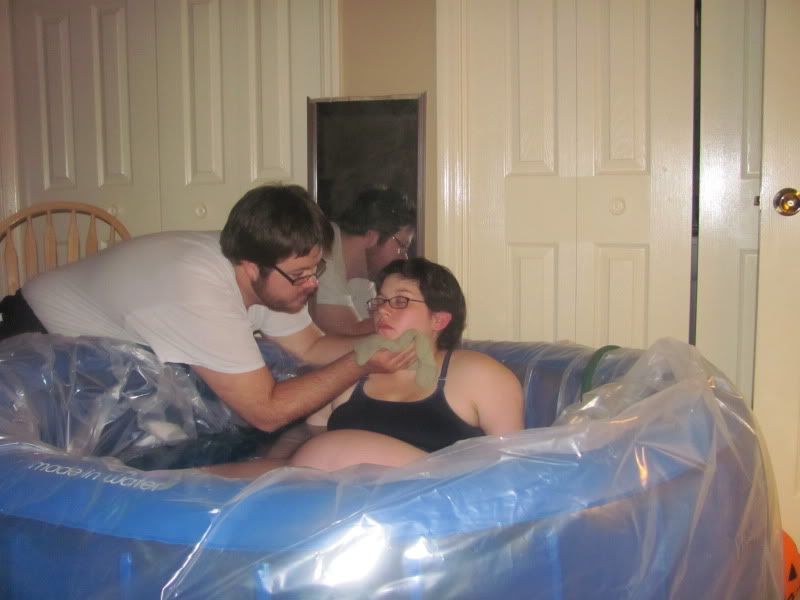
They were coming quickly now. After I’d had just a few contractions in the water, I noticed that my vocalizations were moving from groans to something a little more fierce and growly, and I began to feel like pushing. I got out of the pool to go to the bathroom at Debi’s suggestion. Once I was on the toilet, I very stubbornly refused to move for about three contractions. I did not want to return to the pool where I’d had those last few miserable contractions, or even to the bedroom where much of this long labor had played out. I was afraid of being told it wasn’t actually time to push yet, but I was pushing a bit anyway and it was such a relief. So I just wanted to stay put. Clark asked if I felt like pushing and I cried. “I don’t know, I don’t know, I AM pushing some, it feels good to push. I just want this to END.”
He pretty much made me get out of the bathroom and we returned to the bedroom. I didn’t want the pool, so we got on the bed. Another contraction, a little pushing, 9 centimeters but so very close to 10. Another contraction or two, and I heard those beautiful words: push, give it all that you’ve got. And I did. The contractions were awful and I was so ready to push back, to get my baby out, to finally bring this labor to a close. While I was relatively quiet with Isaac’s birth, I was not quiet with this one. I let it all out; I moaned and groaned and growled and yelled this baby down and out. At one point, in all my exhaustion and gripped by the start of another contraction, I yelled, “I HAAAAAATTTTTTE THIS!!” I could feel the baby moving down low, and I felt stretched beyond reason. Debi said she could see the baby’s hair. And then his head was out. And then, he was out. “Oh, thank God!” I exclaimed. Within moments, he was in my arms and I was telling him how happy I was to see him.
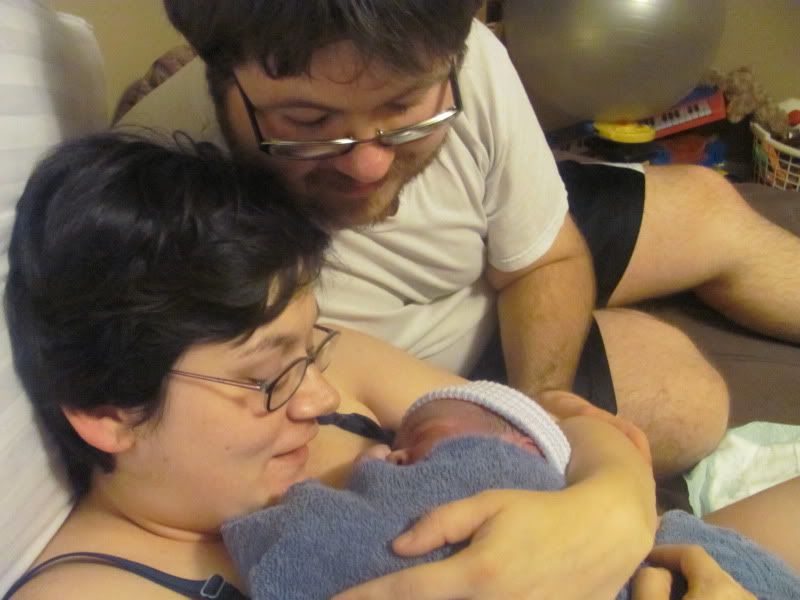
We have no idea when my water broke; this is a real mystery to me. I never had a gush of water during labor, but Debi told me that when she’d checked me at 6 cm, it felt like my water had broken already. That would definitely explain why the contractions were so much more difficult than the ones I’d had with Isaac!
After all that, he was indeed born on Sunday, just barely– at 11:48 PM. I had gone from 6 centimeters to birth in about three and a half hours. He weighed 9 pounds 8 ounces and was 21 inches long. A big baby! And a nameless one; he didn’t have a name until Tuesday afternoon, at
which point we finally settled on Joshua David.
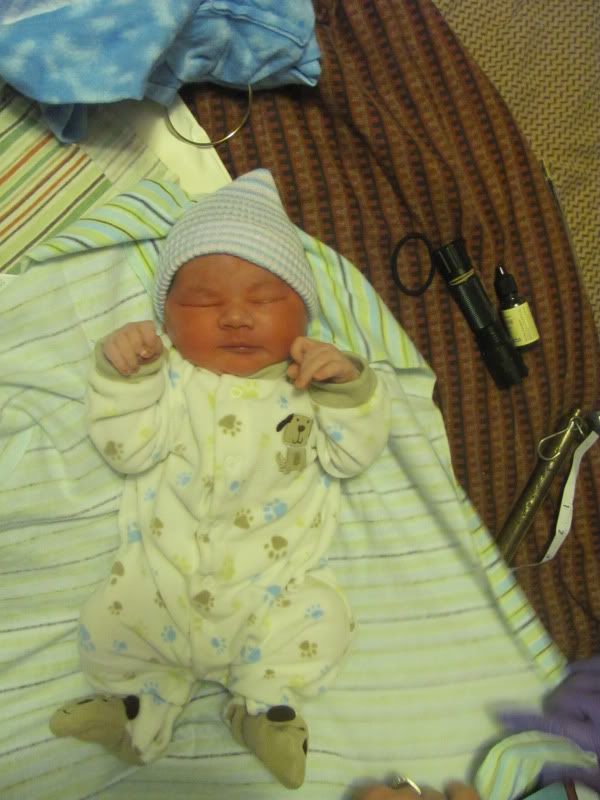
I began having contractions that were timeable and real (not random Braxton Hicks) on Friday, December 2. By Friday evening, they were averaging 4-5 minutes apart and 45-60 seconds long. And then… they pretty much stopped. I had a few here and there during the night and the next morning, and by Saturday afternoon they were becoming more frequent again. But again, they faded by the evening. Saturday night I slept soundly, and if I had any contractions through most of the night, I didn’t notice them.
On Sunday morning, I woke with contractions. “Here we go again,” I thought, wondering just how many days of prelabor I’d end up having. But a trip to the bathroom led me to believe that I might be losing my mucous plug– only it was greenish in color. This was something I hadn’t seen before. Contractions continued, and they were getting slightly stronger, but they were probably 10-15 minutes apart. Still, the color of the mucous plug concerned me a bit, so I went ahead and called Debi, my midwife. She reassured me that it was within the realm of normal, and she offered to come out to my house. I thought that sounded like a good idea. I also called my mom. I didn’t know if it was the real thing or not, but I knew I wanted her with me. Within an hour, she and my dad arrived; his job was to entertain Elijah and Isaac.
Debi arrived and checked me around 9:30. I was 4-5 centimeters dilated and nearly 100% effaced. She began unloading her supplies and equipment from her car, and it hit me that this really was happening. I was actually in labor. It was December 4, the due date. As my best friend said, that’s a little conventional for me.
Things continued moving along very slowly. Contractions remained at least 15 minutes apart, and sometimes they came even less frequently than that. Throughout the morning and afternoon, I took a couple naps, walked around the neighborhood twice, sat and talked with everyone for a while, did hip circles on the yoga ball… and waited. My dad took the boys out to lunch and I hoped things would pick up while they were gone, but no such luck.
We made arrangements for the boys to spend the night with Clark’s dad and stepmom. After they left, probably around 6:00 or so, I began to sense a shift in my mood. I didn’t feel very talkative anymore, didn’t want many people around, and I felt the need to retreat within myself through contractions– which were becoming noticeably stronger and slightly closer together.

By this time I was feeling awfully discouraged. I’d had a long, slow labor with Isaac, and I had really hoped this one would go quickly. I began thinking that maybe contractions would stop yet again, just as they had on Friday and Saturday. Perhaps I wouldn’t have a due date baby after all.
Debi checked me again around 8:30 and I was at 6 centimeters. I felt so discouraged. All those hours and I’d only progressed 1-2 centimeters? She encouraged me to shower, to relax, and maybe get some rest.
I went to the bathroom to shower. Looking back, I think I was rapidly hurtling into transition, but at the time I just felt miserable. I cried in the shower and silently wished for pitocin to speed things up and an epidural so I wouldn’t have to deal with feeling any more contractions. They were coming harder and faster; I had four of them during the time I was in the shower.
After the shower, I tried to rest, but a contraction soon brought me right back out of the bed. I couldn’t sit or lie down; I had to be on my feet to get through them. At this point, contractions became much more frequent and much, much stronger. I leaned against Clark, swaying from side to side, breathing and groaning my way through each one. Debi filled the birth pool, and I got in the water around 10:30.
At first it felt amazing. The constant ache in my lower back was immediately relieved. But then another contraction hit and I found myself scrambling to find a comfortable position. Between contractions, I was fine with leaning back against the side of the pool, but once a contraction began, I couldn’t stand to stay there. I sat up straighter, supporting my weight with my arms, and swayed back and forth. Keeping my hips moving brought some relief from the stronger and stronger contractions.

They were coming quickly now. After I’d had just a few contractions in the water, I noticed that my vocalizations were moving from groans to something a little more fierce and growly, and I began to feel like pushing. I got out of the pool to go to the bathroom at Debi’s suggestion. Once I was on the toilet, I very stubbornly refused to move for about three contractions. I did not want to return to the pool where I’d had those last few miserable contractions, or even to the bedroom where much of this long labor had played out. I was afraid of being told it wasn’t actually time to push yet, but I was pushing a bit anyway and it was such a relief. So I just wanted to stay put. Clark asked if I felt like pushing and I cried. “I don’t know, I don’t know, I AM pushing some, it feels good to push. I just want this to END.”
He pretty much made me get out of the bathroom and we returned to the bedroom. I didn’t want the pool, so we got on the bed. Another contraction, a little pushing, 9 centimeters but so very close to 10. Another contraction or two, and I heard those beautiful words: push, give it all that you’ve got. And I did. The contractions were awful and I was so ready to push back, to get my baby out, to finally bring this labor to a close. While I was relatively quiet with Isaac’s birth, I was not quiet with this one. I let it all out; I moaned and groaned and growled and yelled this baby down and out. At one point, in all my exhaustion and gripped by the start of another contraction, I yelled, “I HAAAAAATTTTTTE THIS!!” I could feel the baby moving down low, and I felt stretched beyond reason. Debi said she could see the baby’s hair. And then his head was out. And then, he was out. “Oh, thank God!” I exclaimed. Within moments, he was in my arms and I was telling him how happy I was to see him.

We have no idea when my water broke; this is a real mystery to me. I never had a gush of water during labor, but Debi told me that when she’d checked me at 6 cm, it felt like my water had broken already. That would definitely explain why the contractions were so much more difficult than the ones I’d had with Isaac!
After all that, he was indeed born on Sunday, just barely– at 11:48 PM. I had gone from 6 centimeters to birth in about three and a half hours. He weighed 9 pounds 8 ounces and was 21 inches long. A big baby! And a nameless one; he didn’t have a name until Tuesday afternoon, at
which point we finally settled on Joshua David.

